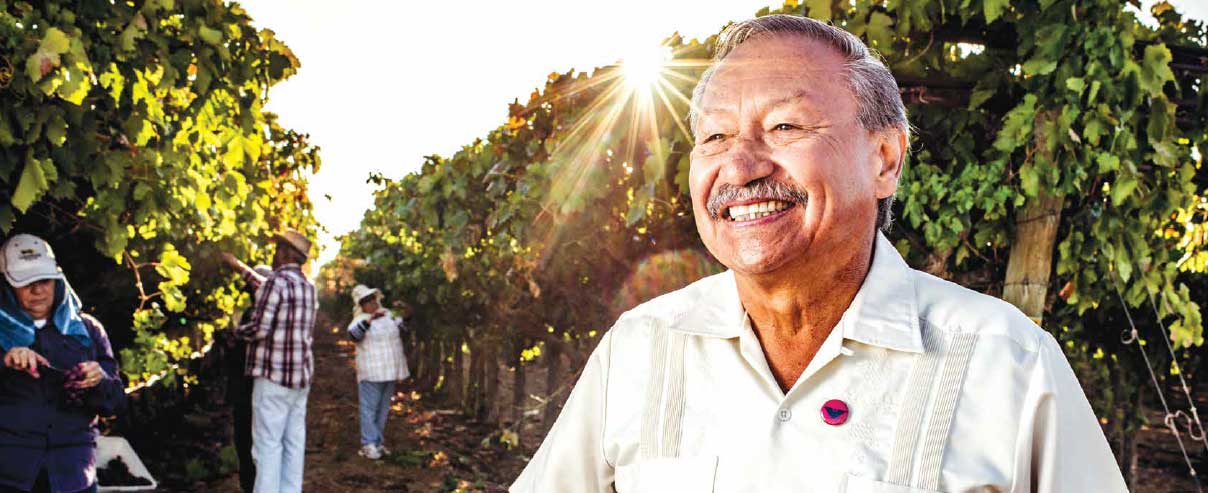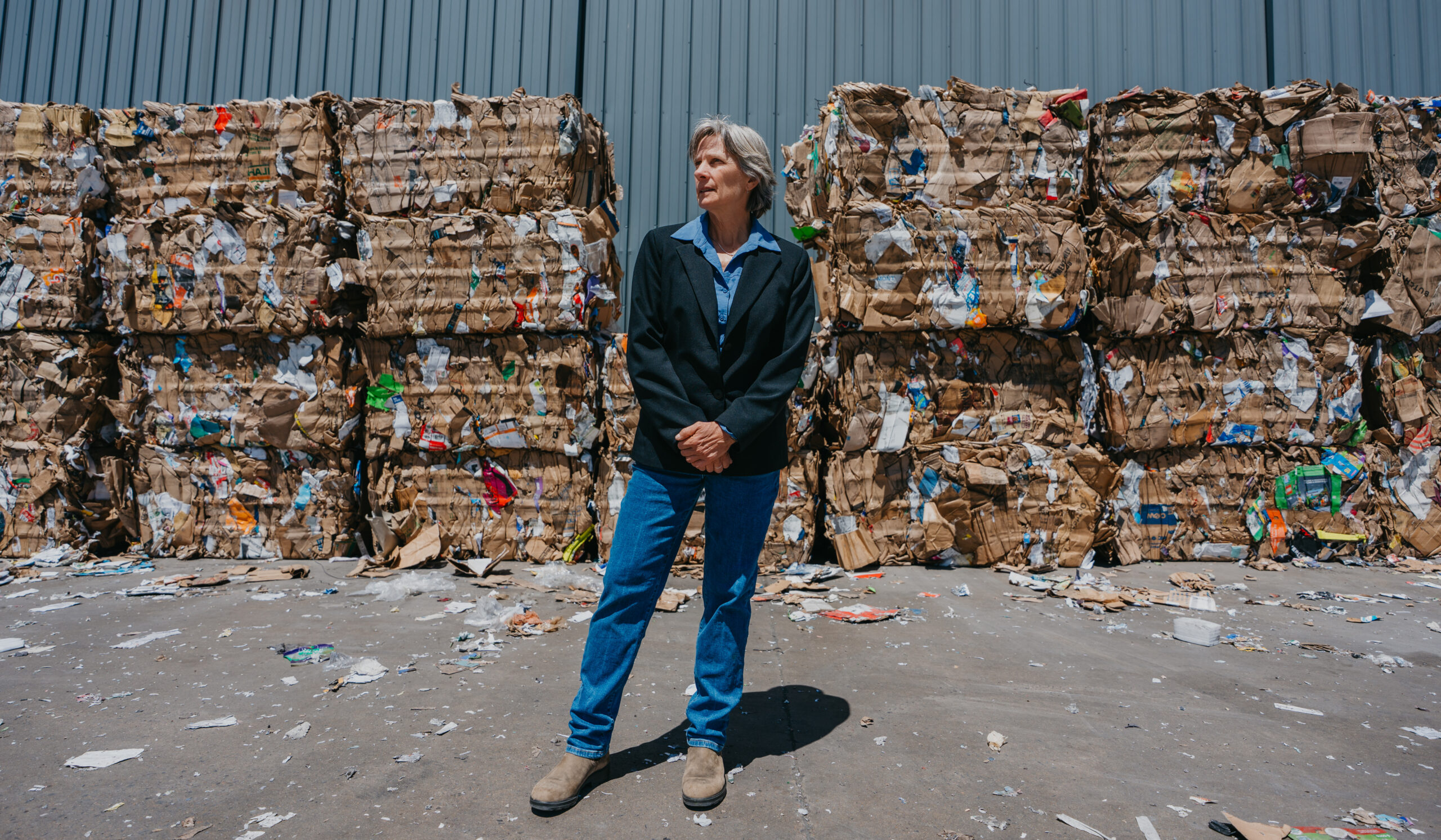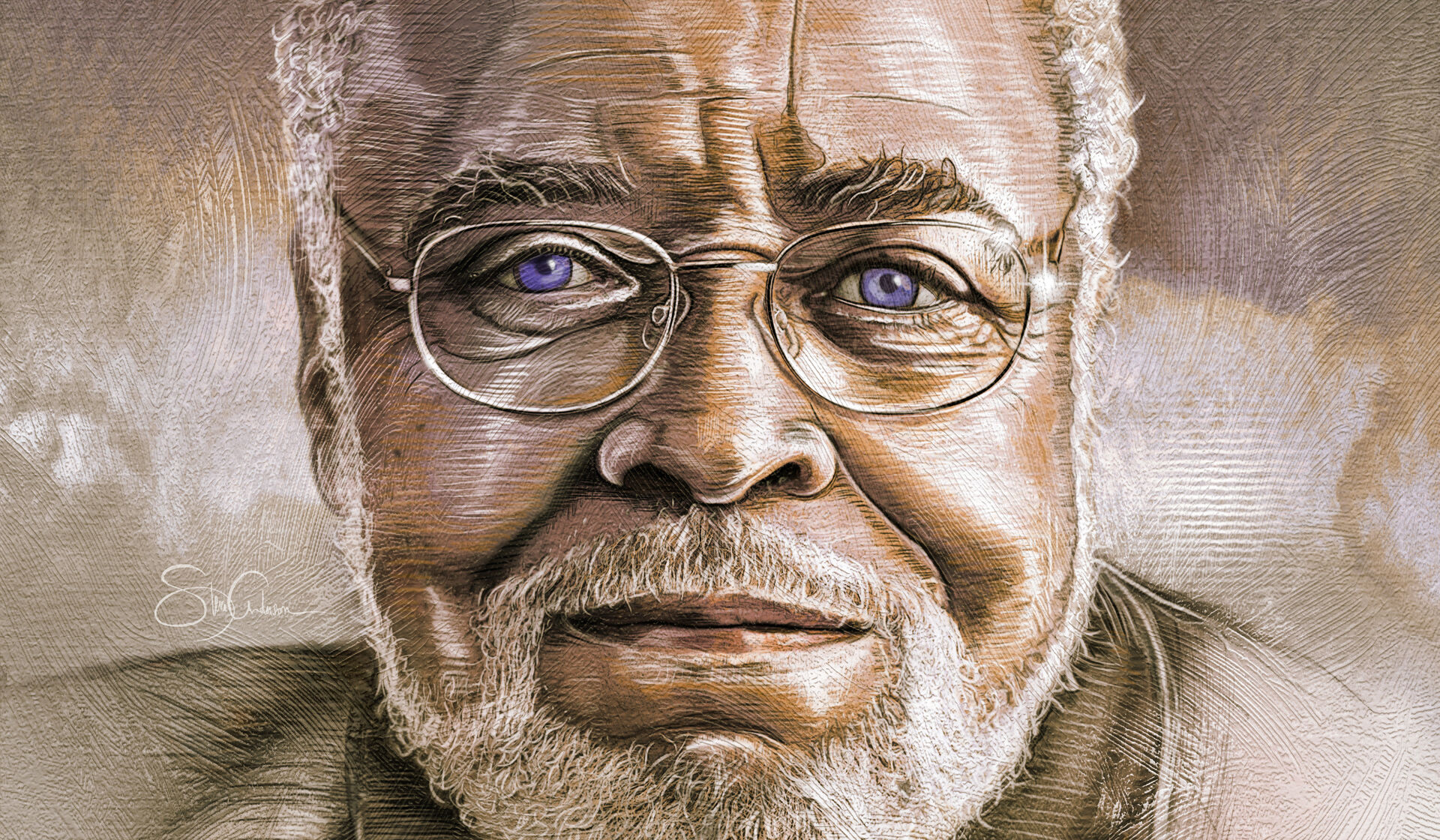On May 5, 1973, Arturo Rodriguez, MSW’73, skipped the pomp and circumstance of U-M commencement ceremonies for a meeting with Richard Chavez, younger brother of United Farm Workers of America president Cesar Chavez, who was organizing the group’s boycott efforts in Detroit. “I told him I was interested in coming to work for the UFW,” he says. There was no money to pay salaries back then — “we were getting $5 a week plus room and board” — but the reward was in the results.
“Poor people can come together and improve their status in this country through organizing,” Rodriguez says in his office at the National Chavez Center, the 187-acre property in Keene, Calif., that has been UFW headquarters since 1971. “I saw the work that Cesar Chavez was doing. I was hot to trot and test the waters and see what I could do.”
Today, he’s still on the job with the UFW, which grew out of a workers’ union founded by Chavez and Dolores Huerta in 1962. Following Chavez’s death in 1993, Rodriguez was tapped to head the organization, whose membership had waned from its late-’70s peak. On his watch, the UFW has grown its numbers; expanded its outreach to include affordable housing, Spanish-language educational radio stations in rural communities, and medical and pension benefits; and partnered up with legislators and retailers for the betterment of its constituents. “It’s much more than a union,” says former UFW colleague Sam Baca, MSW’73, now program director of the Santa Fe Farmers Market Institute. “It’s really a movement for social justice.”
In September, the UFW celebrated the 50th Anniversary of the Delano, Calif., grape strike. The five-year-long dispute ended in July 1970 with a collective bargaining agreement with table-grape growers that affected more than 10,000 farm workers. That victory turned the 5-foot-5-inch Chavez into a larger-than-life folk hero — the movement landed him on the cover of Time magazine in July 1969 — and attracted legions of followers to the UFW’s cause. Those followers included Rodriguez, whose father was a sheet-metal worker in San Antonio, Texas.
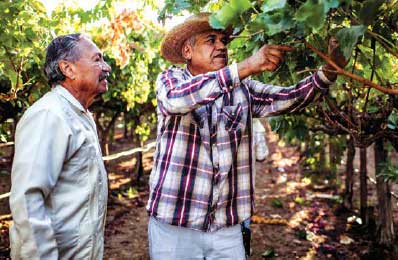
“It was difficult for a lot of people to understand why somebody with a master’s degree would go to work as a volunteer,” says Rodriguez, who did his undergraduate studies in sociology at St. Mary’s University in San Antonio and was the first college graduate in his family. “As time went on, my family, friends, and everybody else began to see the importance of the work.”
Dating back to the Wagner Act of 1935 — which paved the way for workers to organize and bargain collectively with employers — “farm workers had been excluded from every piece of labor legislation this country has passed,” Rodriguez says. That pattern continued in the decades to follow, whether the issue was unemployment insurance, minimum wage laws, or sanitary conditions in the field.
In 1966, Rodriguez’s parish priest became active in the movement in the Rio Grande Valley of south Texas, where a strike was taking place between workers and the owners of melon farms.
“He got arrested and came back and told us all about what Cesar was doing, what the UFW was doing. It sparked a light bulb in my own thinking,” says Rodriguez, whose khaki work shirt sports a button emblazoned with the black Aztec eagle insignia of the UFW. “He was doing it through nonviolent principles, and he was doing it without paying people. That was counter to everything you hear about.”
Thanks to a nationwide effort to recruit minorities to the University of Michigan, Rodriguez learned about the community organization sequence within the School of Social Work.
“It gave me opportunities that I might not have experienced somewhere else,” he says. He worked with forward-thinking professors such as his adviser, Al Wagner, as well as Howard Brabson and Madison James Foster (a strategist and negotiator with the Black Action Movement strike of March 1970 at the University). The experience “helped open my eyes and expand my horizons,” and he fostered lifelong friendships with other students in the program.
During the 1971-72 academic year, Chavez spoke in Hill Auditorium at the invitation of Trabajadores de La Raza, the Chicano student organization at Michigan. “We worked very hard to get a great attendance at the event,” Rodriguez recalls. “He was shorter than I am — not a big, tall, muscular figure at all — but he had a strong will and was extremely committed. You got so inspired by someone like him.”
Following his first year of graduate studies, Rodriguez took a summer job working with migrant farm workers in southeastern Michigan alongside Ignacio Salazar, MSW’72, who ran the program. (Today, he’s president and CEO of SER National, a network of community- based organizations that offers education and workforce development opportunities for the Hispanic community.)
After a recruiting visit by Richard Chavez to the Michigan campus in 1973, “Arturo and I were really captivated by the movement and what they were doing,” says Sam Baca, who worked with Rodriguez in organizing boycotts of lettuce and grape growers at supermarkets in the Detroit area. In their graduate studies, “community organizing is a component of social work that is taught,” Baca adds. “It was the hands-on experience with the boycott that taught us how to organize.”
In September 1973, with boycott efforts in Detroit ramping up, about 80 striking farm workers came out from California to bolster the cause. They were accompanied by two of Cesar’s daughters: Sylvia Chavez Delgado and her husband, George, and 22-year-old Linda Chavez, who once refused to cross a union picket line during a high school field trip. “Linda caught my eye right away,” Rodriguez recalls. “There was something about her that really was impressive.”
Linda and Arturo fell in love. (“We called those ‘boycott romances,’” says Baca, who is the godfather of their oldest daughter, Olivia.) And the two married in March 1974 at the California headquarters of the UFW. “She was just as committed as I was, if not more, to the work, but mostly she was there to support the work I was doing and take care of the family,” Rodriguez says. Linda died in October 2000 at age 49 from complications of scleroderma.
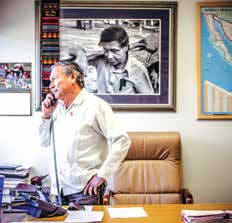
The family stayed in Michigan until August 1975, when more than 500 delegates representing more than 70,000 farm workers gathered in Fresno, Calif., for the organizing convention of the UFW that precipitated a Sept. 8 union vote — the first election held under the California Agricultural Labor Relations Act. “When we won that election, I said, ‘Oh my God, this is awesome. This is why we do what we do. We can transform people’s lives and give them the opportunities that they have never had,’” Rodriguez says.
While today’s UFW works with every facet of the food chain — from growers to big-box retailers — in pursuit of that broad mandate, Rodriguez maintains his passion for the mission. “I’m not ready to hang up the boots yet,” he says with a smile. “I want to make sure that we have a plan in place to give direction to the organization for future years and that we have the people necessary to implement that plan.”
He and his second wife, Sonia, “have discussed how can we take the skills and the opportunities we’ve been afforded and continue life in a way that’s beneficial to folks that haven’t had the same opportunities.” That includes not only better wages but also safer work conditions and, most crucially, immigration reform.
Rodriguez has accomplished all this in the shadow of Cesar Chavez, but one gets the sense that he’s comfortable there. “The movement is strong and Arturo is recognized throughout the country, but he just doesn’t put himself out in a way that would distract from Cesar,” Salazar says.
“He has been an amazing leader for the UFW,” Baca adds. “Cesar Chavez was literally a legend. There are all kinds of streets and schools named after him. To try to fill those shoes is a huge order, but Arturo dedicated his life to the UFW as much as Cesar Chavez did. It will be his legacy.”
UFW: FACTS, FIGURES, AND THE FUTURE
VISION STATEMENT:
“To provide farm workers and other working people with the inspiration and tools to share in society’s bounty.”
NEW DEALS:
On July 28, the UFW inked a new union contract making the 450 California employees of Pacific Triple E the highest paid tomato workers in the nation. Other recent UFW victories have benefited workers in the strawberry, fresh mushroom, and dairy industries as well as wineries.
CHANGE AGENT:
UFW president Arturo Rodriguez was a panelist at the White House Summit on Climate Change on June 23, speaking on behalf of “at least 26 California farm workers” who died in the fields from the heat in recent years. His message: “Climate change cannot be more important than changing the lives of those who feed the rest of us.”
THINKING GLOBALLY:
“The top five retailers control about 60 percent of food sales in the United States, and maybe half of our fruits and vegetables are produced here,” Rodriguez says. “We have to figure out how to stay relevant with the food supply chain not only within our nation but on a global basis as well.”
BILL OF RIGHTS:
At least 80 percent of farm workers in the United States today are undocumented. “There’s no issue that’s more critical to farm workers than immigration reform,” says Rodriguez.
Dick Anderson is a freelance writer living in Los Angeles. His father grew up on the family dairy farm in Lexington, Va.

